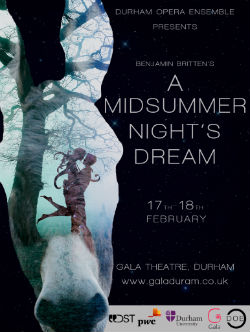 After several years of Mozart and last year’s large scale production of Carmen for their annual full-scale production at the Gala Theatre, Durham Opera Ensemble have ventured into new territory this year, tackling Benjamin Britten’s magical setting of Shakespeare’s A Midsummer Night’s Dream. The musical and artistic challenges that it presents mean that it’s a far harder opera to pull off than a Mozart comedy, so although this production had its weaknesses, it was still an extremely enjoyable evening and I warmly congratulate DOE for their ambition and achievement.
After several years of Mozart and last year’s large scale production of Carmen for their annual full-scale production at the Gala Theatre, Durham Opera Ensemble have ventured into new territory this year, tackling Benjamin Britten’s magical setting of Shakespeare’s A Midsummer Night’s Dream. The musical and artistic challenges that it presents mean that it’s a far harder opera to pull off than a Mozart comedy, so although this production had its weaknesses, it was still an extremely enjoyable evening and I warmly congratulate DOE for their ambition and achievement.
Visually, this production was another stunner. The simple set consisted of two Grecian pillars, framing a bower on a central dais, all laden with flowers, and with a lavishly painted woodland backdrop. Contrasting with this classically pretty scenery, the fairy chorus injected a dose of sharpness in brightly coloured neon lycra: Aztec meets Harlequin is the best way I can describe it and it was an effective reminder that Britten and Shakespeare’s fairies are not childish fantasies but capricious, teasing little beasts. The human characters wore modern dress, heightening the sense that they were astray in this strange dream-world whilst Oberon, Tytania and Puck drifted around between them in floaty white and velvet jackets.
The opening scene immediately highlighted one of the problems of this production, which was that of diction and the balance with the orchestra: from the front row of the circle, I really didn’t get one word of the opening chorus or of Oberon and Tytania’s argument. The fairies were probably softer and gentler than Britten intended but it’s perfectly understandable that a student production should have to use sopranos rather than children. They were well blended, and their final chorus, setting the world to rights had a very sweet tone. Rowena Ashby, playing Tytania showed great agility and after some early shrillness settled into a clean tone with a good command of the musical line. Lewis Cullen in the counter-tenor role of Oberon used his voice very effectively to shield himself an aura of icy stillness, particularly in his dealings with Puck, and there was real magic in his delivery of Britten’s characteristic one-note phrases. I also really enjoyed the way his voice and the orchestra bloomed together in “I know a bank”.
Puck is the only spoken part in the play, with his music being supplied by a shadowing trumpet. What really came across in Alabama Jackson’s excellent performance was the tragic, damaged side of Puck’s character. He’s absolutely in thrall to Oberon, who’s quite happy to take advantage of this obsession, whilst Puck covers up his misery by energetically acting the fool. The scene when Oberon punishes Puck for his mistakes was painful to watch: Lewis Cullen haughty and cool, whilst Alabama Jackson abased herself, wrapped around his ankles.
The biggest problem with the fairy scenes was that despite the excellent singing and beautiful staging, the orchestra never quite managed to transport us to Oberon’s magical kingdom; they remained heavily bound to the earth, with little of the magical lightness that this score really needs, although there was a brief glimpse of it in the violin solo that accompanied Oberon in Act 1.
The four mortals, Demetrius, Lysander, Helena and Hermia have the biggest acting challenge in Britten’s adaptation, as he strips out all their back story, leaving us not entirely sure why the lovers are wandering around in the woods, but the four of them came across with such conviction that we were able to accept this hole in the plot. First-year Amy Porter as Hermia was a delight to listen to, with a fresh, clear voice that carried well, whilst the more experienced Emer Acton as Helena had a powerful delivery with particularly good top notes. George Evans-Thomas as Demetrius and Laurence Kilsby as Lysander were both clear and warm and the quartet as a whole worked really well together. Their awakening scene was particularly good, with excellent timing and unity even when they had their backs to each other.
The best moments came from the fantastic team of mechanicals, with Peter Dunn firmly out-of-control as Quince, and Julian Purdy a big-voiced, pompous Bottom. The six of them sparked off each other in the comedy, both in their own scenes and in their play: Llewelyn Cross’s Flute was hilarious in his cross-dressing, out-of-tune role as Thisbe, without over-doing the camp, and Gus de Tommaso as Snout took his part playing a wall with great seriousness. Britten uses his play-within-a-play to send up older operatic styles and the mechanicals team and orchestra together brought this off very effectively. A final mention must go to Chloe Burrows in her brief role as Hipployta: her strong mezzo really stood out amongst all the sopranos, and I’d definitely like to see her in a bigger role.
So whilst A Midsummer Night’s Dream wasn’t perfect, I was delighted to see a Britten opera being staged in Durham, and Durham Opera should be proud of what they’ve achieved.








